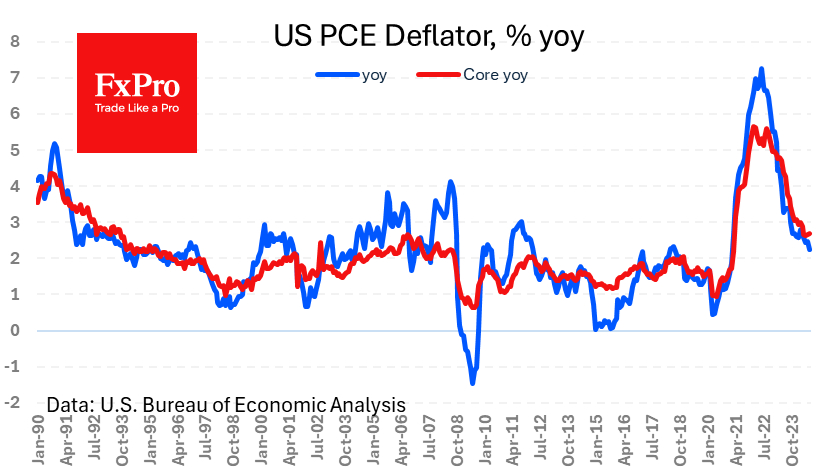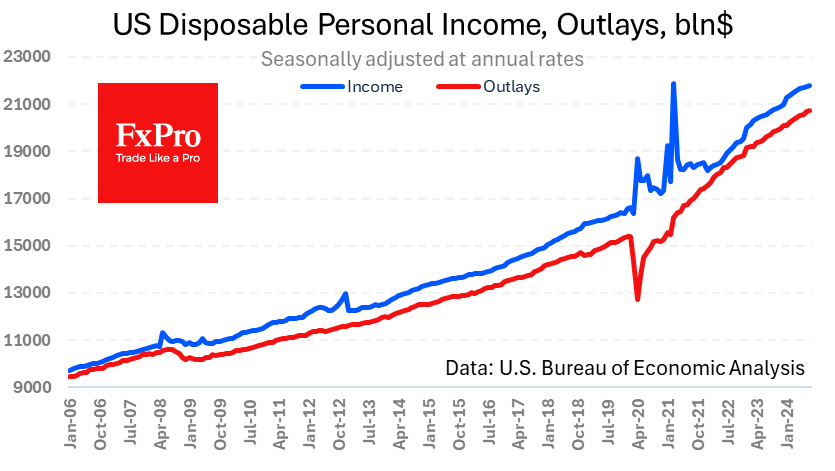The core US personal consumption price index (the Fed’s preferred inflation gauge) rose slightly less than expected to show inflation at 2.7% y/y. The indicator is above the target of 2% in February 2021 and accelerated with 2.6% in the previous two months.
Just over a week ago, the Fed decided to make a decisive 50-point cut in the federal funds rate, even though inflation was well above target. In addition to that, the fact that the Fed is following the updated strategy whereby the Fed is aiming for 2% ‘over the period’ raises questions. This means that it will take several months or quarters before the technical signal of easing policy because of inflation. The latest report does not change the expectations of the Federal Reserve System’s market, giving a 52% chance to reduce the rate by 50 points at the next meeting in early November. Such expectations and the actual dovishness of the central bank fuel risk appetite in the financial markets.
No less important in the published report are the indicators of private consumption. Formally, the monthly momentum was worse than expected, with spending rising 0.2% versus 0.5% and expectations of 0.3%, and incomes rising 0.2% versus 0.3% and expectations of 0.4%. However, the Bureau of Economic Analysis revised these data series from January 2019 with significantly higher income figures, which boosted the savings rate. Previously, the savings rate had been close to its pre-mortgage crisis low of 3%, but now it’s 4.8% in the latest data and 5.1% on average over the past six months.
The much more optimistic income estimate largely explains the resilience of spending growth in recent months, which we have attributed to the debt burden. However, it is also a pro-inflationary risk.
Either way, if it doesn’t worry the markets or the Fed, strong spending growth boosts the economy and is good for equity valuations.
The FxPro Analyst Team
- English (UK)
- English (India)
- English (Canada)
- English (Australia)
- English (South Africa)
- English (Philippines)
- English (Nigeria)
- Deutsch
- Español (España)
- Español (México)
- Français
- Italiano
- Nederlands
- Polski
- Português (Portugal)
- Português (Brasil)
- Русский
- Türkçe
- العربية
- Ελληνικά
- Svenska
- Suomi
- עברית
- 日本語
- 한국어
- 简体中文
- 繁體中文
- Bahasa Indonesia
- Bahasa Melayu
- ไทย
- Tiếng Việt
- हिंदी
Recent US Data Paints Improving Economic Picture
Published 09/30/2024, 04:11 AM
Recent US Data Paints Improving Economic Picture
Latest comments
Loading next article…
Install Our App
Risk Disclosure: Trading in financial instruments and/or cryptocurrencies involves high risks including the risk of losing some, or all, of your investment amount, and may not be suitable for all investors. Prices of cryptocurrencies are extremely volatile and may be affected by external factors such as financial, regulatory or political events. Trading on margin increases the financial risks.
Before deciding to trade in financial instrument or cryptocurrencies you should be fully informed of the risks and costs associated with trading the financial markets, carefully consider your investment objectives, level of experience, and risk appetite, and seek professional advice where needed.
Fusion Media would like to remind you that the data contained in this website is not necessarily real-time nor accurate. The data and prices on the website are not necessarily provided by any market or exchange, but may be provided by market makers, and so prices may not be accurate and may differ from the actual price at any given market, meaning prices are indicative and not appropriate for trading purposes. Fusion Media and any provider of the data contained in this website will not accept liability for any loss or damage as a result of your trading, or your reliance on the information contained within this website.
It is prohibited to use, store, reproduce, display, modify, transmit or distribute the data contained in this website without the explicit prior written permission of Fusion Media and/or the data provider. All intellectual property rights are reserved by the providers and/or the exchange providing the data contained in this website.
Fusion Media may be compensated by the advertisers that appear on the website, based on your interaction with the advertisements or advertisers.
Before deciding to trade in financial instrument or cryptocurrencies you should be fully informed of the risks and costs associated with trading the financial markets, carefully consider your investment objectives, level of experience, and risk appetite, and seek professional advice where needed.
Fusion Media would like to remind you that the data contained in this website is not necessarily real-time nor accurate. The data and prices on the website are not necessarily provided by any market or exchange, but may be provided by market makers, and so prices may not be accurate and may differ from the actual price at any given market, meaning prices are indicative and not appropriate for trading purposes. Fusion Media and any provider of the data contained in this website will not accept liability for any loss or damage as a result of your trading, or your reliance on the information contained within this website.
It is prohibited to use, store, reproduce, display, modify, transmit or distribute the data contained in this website without the explicit prior written permission of Fusion Media and/or the data provider. All intellectual property rights are reserved by the providers and/or the exchange providing the data contained in this website.
Fusion Media may be compensated by the advertisers that appear on the website, based on your interaction with the advertisements or advertisers.
© 2007-2025 - Fusion Media Limited. All Rights Reserved.
